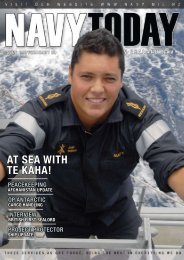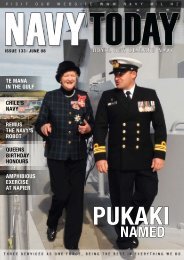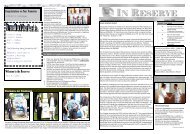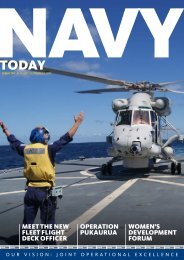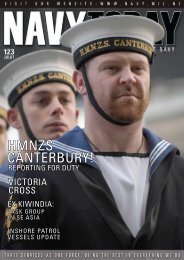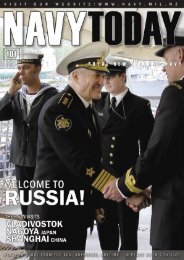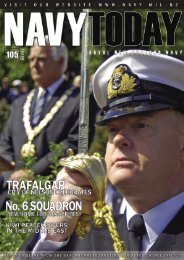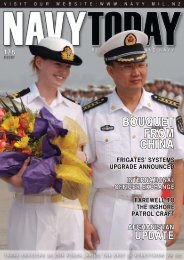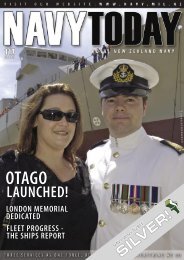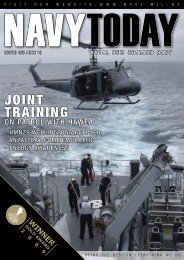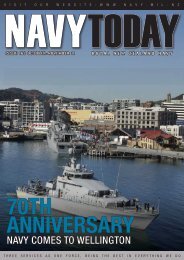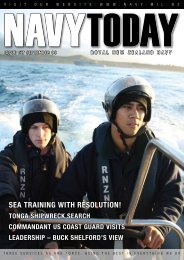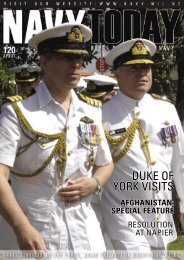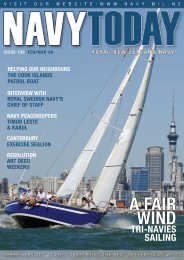May 2012, Issue 166 - Royal New Zealand Navy
May 2012, Issue 166 - Royal New Zealand Navy
May 2012, Issue 166 - Royal New Zealand Navy
You also want an ePaper? Increase the reach of your titles
YUMPU automatically turns print PDFs into web optimized ePapers that Google loves.
YOURS AYE<br />
by rear admiral tony parr, Chief of <strong>Navy</strong><br />
‘Sea blindness’ is a term that has been much bandied<br />
about in recent years in high-level discussions about<br />
maritime security. It means a lack of appreciation of<br />
the vital role Naval power plays to ensure maritime<br />
security and economic prosperity on the world’s oceans<br />
and waterways.<br />
Are we guilty of sea blindness in <strong>New</strong> <strong>Zealand</strong>? It would be nonsense<br />
to say that the sea doesn’t matter to us – there’s no escaping we are<br />
an island nation. Is it not our God-given right to swim in the sea, surf<br />
its waves, set boats afloat on it, fish in it and exploit it for the mineral<br />
wealth it holds on and under its bed?<br />
Despite our awareness of these matters it often seems the public are<br />
more focused on matters such as environmental issues and lawlessness<br />
at sea than on the broader strategic, economic and geo-political issues.<br />
As a result there is a tendency to focus on our ‘green water’ and ‘brown<br />
water’ fleets that are employed in coastal and constabulary tasks, not<br />
the ‘blue water’ role we have played for many years.<br />
This focus is understandable. Protection and conservation of the<br />
resources of the sea are acknowledged as being in our national interest:<br />
our Exclusive Economic Zone is the fifth largest in the world. At another<br />
level our island status shapes our perception of national security. It would<br />
take a lot of convincing a <strong>New</strong> <strong>Zealand</strong>er that someone is going to come<br />
1000 miles across the open sea from Australia to invade us.<br />
Nevertheless, there is no denying that the sea is the medium by which<br />
our economy is sustained. Amongst other things we import almost all of<br />
our oil by sea. Conversely, almost all of the vital meat, wool and dairy<br />
products that leave our shores to overseas markets goes by sea. The<br />
volume of global trade transported by sea has increased four fold in<br />
the last 40 years so that now more than nine tenths of world trade is<br />
carried by sea. It follows that security of the sea lanes on the world’s<br />
oceans and freedom of navigation on the high seas is very much in our<br />
national interest.<br />
Most trading countries have a common interest in ensuring that freedom<br />
to navigate the oceans of the world is preserved. This collective interest<br />
ensures that threats of a hostile, terrorist and criminal nature are neither<br />
tolerated nor allowed to proliferate. These acts extend from the threat<br />
or use of submarines in maritime choke points to acts of piracy and<br />
people or drug smuggling.<br />
The <strong>Navy</strong>’s ships and people are the instruments whereby the<br />
Government contributes to the freedom of navigation globally, and<br />
which can be deployed on missions to ensure that our national interest<br />
is maintained and preserved. Our ships rarely do this alone. Over the<br />
past twenty years our frigates have been regularly sent to the world’s<br />
maritime hotspots in the Middle East and South East Asia, with allies<br />
and international partners where national interests are aligned.<br />
The <strong>Navy</strong> is sometimes known as the Silent Service. Perhaps this is<br />
because historically Naval ships have deployed continuously but largely<br />
unseen across the oceans of the world. When the time comes, as it<br />
inevitably will, to respond to tragedy, illegal activity or threats to peace<br />
and good order you can rest assured our frigates and their crews will<br />
be ready to answer the call.<br />
WOMM Mick O'Carroll (left) receiving Chief of<br />
<strong>Navy</strong>'s Commendation from RA Parr.<br />
WWW.NAVY.MIL.NZ NT<strong>166</strong>april-may12 3



